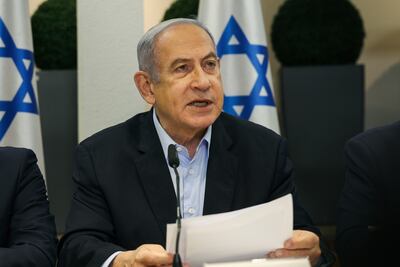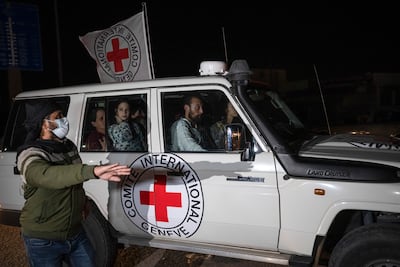Live updates: Follow the latest news on Israel-Gaza
A proposed agreement to pause the fighting in Gaza between Israel and Hamas envisages a truce of up to three months and a detainee and hostage exchange under which as many as 5,000 Palestinians could be freed from Israeli prisons, sources told The National on Tuesday.
But, they added, Hamas is standing by its demand for a permanent ceasefire and international guarantees for a full withdrawal of Israeli forces from Gaza.
“The draft was sent to Hamas last night in Gaza and the tentative response was a ‘no’ but included a tentative ‘yes’ to most provisions,” said one of the sources.
“They said they will give their final and detailed answer by the end of the week.”
The head of Hamas's political wing, Ismail Haniyeh, said on Tuesday that the group was studying the proposals and that he would visit Cairo to discuss them further.

He added that Hamas was open to any “serious and practical initiatives or ideas, provided that they lead to a comprehensive cessation of aggression” and the complete withdrawal of Israeli forces from Gaza.
US Secretary of State Antony Blinken voiced hope on Monday that the agreement would halt the fighting in exchange for liberating the 132 hostages held by Hamas in Gaza.
“Very important, productive work has been done. And there is some real hope going forward,” Mr Blinken said after meeting Qatari Prime Minister Sheikh Mohammed bin Abdulrahman in Washington. Both the US and Qatar have been heavily involved in mediating the truce talks.
“Hamas will have to make its own decisions. I can just tell you that there is good, strong alignment among the countries involved that this is a good, strong proposal,” Mr Blinken said.
Sheikh Mohammed also said progress has been made in the negotiations.
The proposal was drawn up during talks in Paris that began on Sunday between CIA chief William Burns, his Egyptian and Israeli counterparts, and officials from Qatar.
Prime Minister Benjamin Netanyahu said that Israel would not “release thousands of terrorists”.
“I would like to make it clear: we will not withdraw [the Israeli army] from the Gaza Strip and we will not release thousands of terrorists,” he said at Eli settlement in the occupied West Bank.
“None of this will happen.”
His office had earlier called the talks “constructive” but pointed to “significant gaps which the parties will continue to discuss”.
The sources said Hamas did not want an agreement that allowed Israel to resume its offensive in Gaza after all hostages are released.
They also pointed out that Mr Netanyahu had vetoed previous attempts to halt the fighting.
Mr Netanyahu has repeatedly said the war will not end until Hamas is defeated and its military and governance capabilities are dismantled.

Israel’s air and ground campaign in Gaza has killed more than 26,700 Palestinians, displaced most of the enclave’s 2.3 million residents and razed large swathes of the territory’s built-up areas.
The war began on October 7 when Hamas launched a surprise attack on southern Israel, killing about 1,200 people, mostly civilians, and taking about 240 hostages.
“It is clear that there are contradictions that are difficult to overcome in an attempt to draw a road map,” a source in Gaza close to the Palestinian Authority, which governs the occupied West Bank, told The National.
“Israel set a war goal to eliminate Hamas as a military [force] and as a ruling authority. But it is forced to negotiate with Hamas to release its prisoners,” the source said.
“The length of the war and its consequences have forced Israel in the past to negotiate for truces and exchanges, and today for exchanges and long truces. But it is also worth mentioning that the Paris meeting was preceded by similar meetings in more than one European capital that did not lead to the desired result.”
The latest draft partially mirrors Egyptian proposals that were discussed in recent weeks but eventually rejected by Israel and Hamas.
It provides for a truce of up to three months and a three-phase detainee and hostage exchange, during which Hamas would free the rest of the captives it holds in Gaza in return for the release of Palestinians from Israeli prisons.
Hamas freed more than 100 hostages during a week-long truce in November last year, while Israel released hundreds of Palestinian detainees from its jails. The truce collapsed on December 1.

Under the latest proposals, the first group of hostages will be made up of about 40 women, elderly people and those in need of medical treatment, the sources said.
The second group will include five female Israeli soldiers as well as the remains of hostages who have died since October 7.
The third group to be released will be made up of male civilians and active-duty Israeli military personnel, including officers.
Hamas remains adamant that the proposed 4,000-5,000 Palestinian detainees to be freed should include high-profile figures sentenced to life or long-term jail sentences, including Marwan Barghouti of Fatah, and Ibrahim Hamed, a senior commander of Hamas’s military wing.
In terms of the ratio of detainees to hostages for release, it has been proposed that Israel could free 100 Palestinians for every civilian hostage and 250 for every soldier.
Hamas and Israel would be expected to announce the names of the hostages and detainees to be released on the day of the exchange, the sources said, with delegates from the International Committee of the Red Cross and Egyptian security officials overseeing the logistics of the swap.
The Israeli withdrawal from Gaza, according to the proposal, would be carried out in tandem with the return of hundreds of thousands of displaced Palestinians to their homes in northern Gaza, having been forced to move southwards by the war.
The sources said Cairo would use the proposed truce to try to reconcile rival Palestinian factions, a goal that has for years eluded Egyptian mediators, in a bid to form an interim government in Gaza that oversees the reconstruction of the territory and prepares for legislative and presidential elections.
Egypt, which borders both Israel and Gaza, does not believe that Hamas could be completely left out of any postwar scenarios for the enclave and, like Washington, advocates for a demilitarised Palestinian state in Gaza and the West Bank that exists alongside Israel.
Mr Netanyahu has rejected the two-state solution, while Hamas has rejected the idea that a future Palestinian state should be demilitarised.
Hamas has governed Gaza since 2007, when it expelled representatives of Fatah from the territory in a brief civil war. Israel unilaterally withdrew from the strip in 2005, ending 38 years of occupation.

